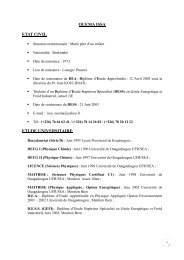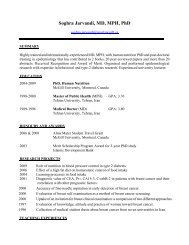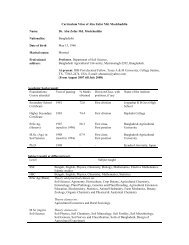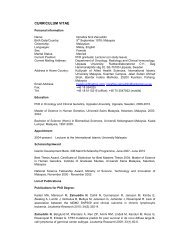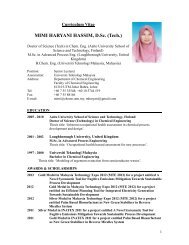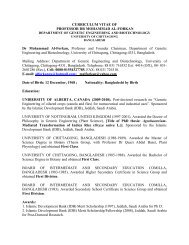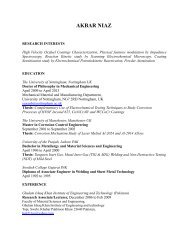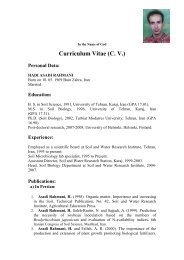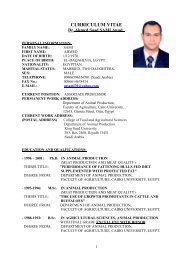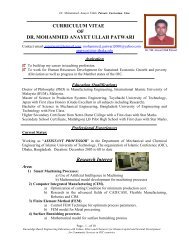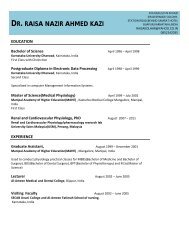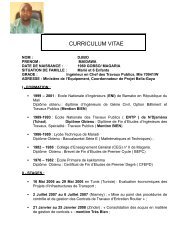Engineering: issues, challenges and opportunities for development ...
Engineering: issues, challenges and opportunities for development ...
Engineering: issues, challenges and opportunities for development ...
Create successful ePaper yourself
Turn your PDF publications into a flip-book with our unique Google optimized e-Paper software.
AN OVERVIEW OF ENGINEERINGCooperation’ at the Open University of Catalonia in Barcelona– a course that the university has now taken on itself. TheUniversity of Colorado at Boulder has recently established theMortenson Centre in <strong>Engineering</strong> <strong>for</strong> Developing Communities,with the founder of EWB-USA as its director.EWB in the context of societyIt is interesting to reflect on the growth spurt in the EngineersWithout Borders movement. Since the year 2000, more thanfifty EWB groups have been established. In many developedcountries, EWB groups were set up by university engineeringstudents who were perhaps influenced by fundamental shiftsin their societies. This new generation of engineers grew uphearing about famine in Ethiopia, Live Aid, the hole in theOzone Layer, acid rain, the Rio de Janeiro Earth summit, theRw<strong>and</strong>an Genocide, global warming, the Jubilee Debt campaign,the Millennium Development Goals, the rise of FairTrade, climate change, the Indian Ocean Tsunami <strong>and</strong> theMake Poverty History campaign. They started university atthe start of a new millennium. They never knew a world withoutthe Internet, fast <strong>and</strong> af<strong>for</strong>dable international travel <strong>and</strong>mobile communications. Their social networks spanned theglobe. They might well have travelled to different continents<strong>and</strong> seen <strong>and</strong> experienced how difficult cultures live. They had,arguably, a much more global worldview than the generationsof engineers who came be<strong>for</strong>e them, <strong>and</strong> they were very concernedabout global <strong>issues</strong>. Their new perspective dem<strong>and</strong>ed anew engineering expression, <strong>and</strong> many chose EWB.With privatization <strong>and</strong> liberalization, engineering had becomeless focused on the public good <strong>and</strong> more focused on privateprofit. Governments <strong>and</strong> engineering firms seemed not to beaddressing human <strong>development</strong> <strong>for</strong> all, <strong>and</strong> focused moreon economic or commercial <strong>development</strong>. Aid agencies didnot want ‘enthusiastic amateurs’ <strong>and</strong> – not recognizing thepotential in this new generation – were slow to engage meaningfullywith university-level volunteers. So where did theseyoung engineers turn to if they wanted to get involved in global<strong>issues</strong>? They chose EWB.ConclusionEngineers Without Borders represents a new renaissance inthe engineering community. With a global agenda <strong>and</strong> anappetite <strong>for</strong> change, EWB groups could not come at a bettertime. The present role of engineering in <strong>development</strong> policyseems to be of economic importance only, <strong>and</strong> that it is a keypath of innovation <strong>and</strong> there<strong>for</strong>e economic growth. The economicimperative of engineering is sound, but international<strong>development</strong> ef<strong>for</strong>ts – in good governance, transparency, anticorruption,health treatments <strong>and</strong> primary education – arefrequently crippled because basic needs are not being metby engineers. What is needed is a new ‘<strong>development</strong> decade’where a new generation of engineers who underst<strong>and</strong> global<strong>issues</strong> <strong>and</strong> social dimensions, play an active role. The signs arethat EWB groups are helping to bring about this change inunderst<strong>and</strong>ing.For the engineering profession, EWB groups offer ideas <strong>and</strong>concerns that are profoundly motivating <strong>for</strong> young engineers,professional engineers <strong>and</strong> school children alike. The idea ofhelping people, the joy of h<strong>and</strong>s-on engineering, the abilityto see clearly the difference that an engineer can make, theadventure of helping solving global problems... EWB groupsembody the very purpose of the engineering profession <strong>and</strong>will, <strong>for</strong> many, come to define the engineering profession.The EWB movement was started by students in universities<strong>and</strong>, as such, has had a very close association with the problems<strong>and</strong> potential of engineering education. As EWB groupsbegin to demonstrate the value of studying technology in<strong>development</strong>, perhaps in the future their role will change.Many countries suffer from an extreme shortage of engineers. Bamboo wall rein<strong>for</strong>cementreduces the risk ofcollapse in earthquakes <strong>and</strong>saves lives.Graduate <strong>and</strong> young professional engineers wanted jobs thatnot only paid well but that were intellectually stimulating <strong>and</strong>personally fulfilling as well. When they could not find ways tohelp people as part of their day job, they turned increasingly tothe voluntary sector <strong>and</strong> to EWB groups in particular. Wherean EWB group did not exist, these professional engineers setone up. Certainly, voluntary groups cannot work on the scaleof companies – the scale that is required to meaningfully meetglobal <strong>challenges</strong>. But, one project at a time, EWB membersrealized that they could make a difference. It seems bizarre thatso many engineers put their hopes <strong>and</strong> dreams into such tinyorganizations as EWB groups when, <strong>for</strong> most of their professionallives, they would work in large firms that have far morescope <strong>and</strong> capacity to drive change. But they chose EWB.© Stephen Jones, EWB-UK163



